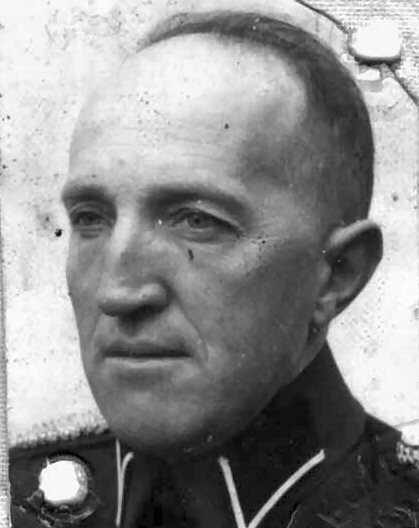Beuvink, Gerhardus Johannes
- Date of birth:
- September 21st, 1902 (Losser, the Netherlands)
- Date of death:
- February 14th, 1970 (Nijmegen, the Netherlands)
- Nationality:
- Dutch
Biography
Gerhardus (Gerard) Johannes Beuvink was born on September 21st 1902 in Losser. After his primary school, he went to work in a textile factory, something that was very common in that part of the Netherlands in that period. Besides that it was common that he also had to work at his fathers farm.
In 1921 he served as an enlisted man according to drafting number 45 with the Regiment Wielrijders (Cycling Regiment) in Den Bosch. After his service he went to work with his old employer again. Between March 1928 and June 1932 he changed from this work to that of a nightwatcher in the municipality of Losser. This function made him an unpaid policeman at the same time. He married J.H.M. (Truus) Wensing on May 8th 1930. The couple would get a large family with six sons and one daughter. Later they took in a foster daughter as well. In 1931 he received his police certificate. Soon he found a job as policeman (veldwachter) in the municipality of Escharen near Grave (June 29th 1932).
In those days, Escharen was a small community with round 1200 inhabitants. The majority of whom were farmers and lived in a relative large area. In such a small community the mayor, the priest and the local policeman have an important and special roll. They know almost everything that goes along in the community and play a central role in various problems that have to be solved. For special police business, Beuvink was under the command of the Openbaar Ministerie (Office of the Public Prosecutor) in Den Bosch.
In 1941 it became obvious that the municipality of Escharen was to become a part of the city of Grave. A small part of the community was placed under the neighbouring municipality of Langenboom.
For policeman Beuvink this did not have many consequences. Until March 1st 1943 he was placed as policeman in Grave. On that date he was transferred to the Marechaussee (form of Military Police) in Langenboom, where he became station commander. In this function he stayed until July 1st 1945, after what he received the same position in Escharen. During the whole period he lived in Escharen where he was known to the local people as a friendly and caring servant. And all that time his house was used as a hideout for Secret Agents and soldiers that had to be kept out of enemy hands.
Beuvink left his post on April 1st 1946 for a few months when he became station commander at Volkel, but on June 15th he was transferred to Zeeland, as Opperwachtmeester of the Rijkspolitie (Government Police ) until his retirement.
After the second World War he received the Bronzen Kruis (Bronze Cross) out of the hands of Prince Bernhard for his resistance work during the Second World War.
Gerard Beuvink died on February 14th 1970 in Nijmegen. On September 18th 2005 a special monument was erected in Escharen for the former policeman of that community.
Do you have more information about this person? Inform us!
- Period:
- Second World War (1939-1945)
- Rank:
- Opperwachtmeester der Staatspolitie (Policeman)
- Unit:
- Staatspolitie (later Rijkspolitie)
- Awarded on:
- June 19th, 1950
"Because of his part in finding new places to drop in radio operators. Also for helping to find new dropping places and new sources of information."
After a while his house was raided by the enemy. Beuvink managed to escape, but his wife was caught. She withstood the interrogations by the SD and said nothing. She was released after a few months. Beuvinks assistance was no longer usefull due to him being searched by the enemy.
By Royal Decree No. 9 on January 2nd 1950 and received on Juni 19th 1950 out of the hands of Prins Bernhard, during a ceremony in the Ridderzaal in The Hague.
Sources
- Photo: Hans Beuvink
- - Timmermans J., Veldwachter Gerard Beuvink te Escharen: verzet in uniform (1940-1944)”, Grave, sept. 2005



